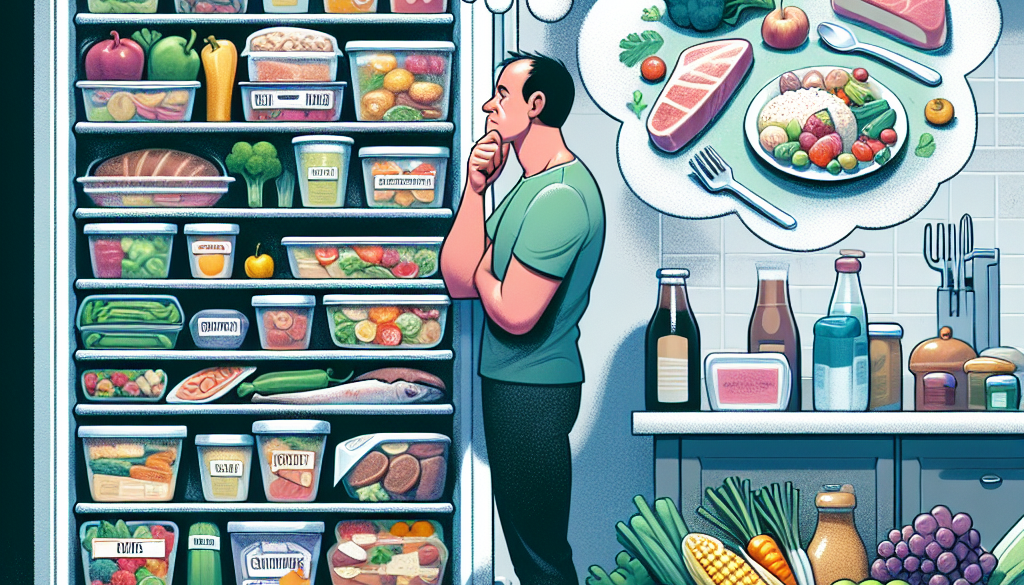Disadvantages of Eating Frozen Food
-
Table of Contents
- Exploring the Disadvantages of Eating Frozen Food
- Nutritional Deficiencies in Frozen Foods
- High Sodium Content in Frozen Meals
- Additives and Preservatives in Frozen Foods
- Caloric Density and Portion Control
- Environmental Impact of Frozen Foods
- Impact on Taste and Texture
- Conclusion: Weighing the Pros and Cons of Frozen Foods
- Discover Healthier Alternatives with ETprotein’s Protein Products
Exploring the Disadvantages of Eating Frozen Food

Frozen foods have become a staple in many households due to their convenience and long shelf life. However, while they offer several benefits, there are also significant disadvantages associated with their consumption. This article delves into the drawbacks of eating frozen food, providing insights and statistics to help consumers make informed dietary choices.
Nutritional Deficiencies in Frozen Foods
One of the primary concerns with frozen foods is the potential loss of nutritional value. While freezing can preserve nutrients to some extent, the initial processing and preparation of frozen meals often involve blanching or partially cooking the ingredients, which can lead to a reduction in vitamins and minerals. For instance, water-soluble vitamins like vitamin C and B vitamins are particularly susceptible to degradation during the freezing process.
- Loss of water-soluble vitamins during blanching
- Reduced antioxidant content in frozen fruits and vegetables
- Potential for lower fiber content in processed frozen meals
High Sodium Content in Frozen Meals
Frozen meals are notorious for their high sodium content. Sodium is often added as a preservative to extend shelf life and enhance flavor. According to the Centers for Disease Control and Prevention (CDC), more than 70% of sodium intake comes from processed and restaurant foods, including frozen meals. Excessive sodium consumption is linked to an increased risk of hypertension, heart disease, and stroke.
- Increased risk of hypertension from high sodium levels
- Association with heart disease and stroke
- Difficulty in managing sodium intake with frequent consumption of frozen meals
Additives and Preservatives in Frozen Foods
Many frozen foods contain additives and preservatives to maintain their color, texture, and taste. These can include artificial flavors, colors, and emulsifiers. Some of these additives have been the subject of health concerns, with studies suggesting potential links to adverse health effects. Consumers seeking clean eating habits may find the presence of these chemicals undesirable.
- Presence of artificial flavors and colors
- Potential health concerns linked to certain additives
- Impact on clean eating and natural food preferences
Caloric Density and Portion Control
Frozen meals can be deceptively high in calories, making portion control a challenge. The convenience of a single-serving meal may lead to overconsumption, especially when the serving sizes are smaller than expected. This can contribute to weight gain and associated health issues such as obesity and diabetes.
- Higher calorie content in some frozen meals
- Challenges with portion control and overconsumption
- Contribution to weight gain and obesity-related health issues
Environmental Impact of Frozen Foods
The production, packaging, and distribution of frozen foods have environmental implications. The energy required for freezing and transportation contributes to carbon emissions, while the packaging materials used for frozen products may not always be sustainable or recyclable. Consumers concerned about their ecological footprint may consider these factors when choosing frozen foods.
- Energy consumption for freezing and transportation
- Carbon footprint associated with frozen food production
- Environmental concerns regarding packaging waste
Impact on Taste and Texture
Despite technological advancements in freezing methods, some frozen foods can suffer from altered taste and texture. Freezing can cause cellular damage to certain foods, leading to a mushy or dry texture upon reheating. Additionally, the taste of frozen meals may not compare favorably to their fresh counterparts, potentially leading to a less satisfying dining experience.
- Changes in texture due to freezing and reheating
- Potential for diminished taste quality
- Comparison to fresh food dining experiences
Conclusion: Weighing the Pros and Cons of Frozen Foods
In conclusion, while frozen foods offer convenience and extended shelf life, they come with several disadvantages that consumers should consider. Nutritional deficiencies, high sodium content, additives, caloric density, environmental impact, and compromised taste and texture are all factors that may influence one’s decision to include frozen foods in their diet. By understanding these drawbacks, individuals can make more informed choices about their food consumption and overall health.
Discover Healthier Alternatives with ETprotein’s Protein Products
If you’re looking for healthier dietary options that prioritize nutrition without compromising on taste, ETprotein’s range of protein products may be the perfect solution. ETprotein offers a variety of organic bulk vegan proteins that are non-GMO, allergen-free, and boast a neutral taste. Their products, including Organic rice protein, pea protein, and various seed proteins, provide a nutritious alternative to frozen meals, catering to those seeking clean, plant-based protein sources.
For individuals looking to enhance their diet with high-quality protein while minimizing the disadvantages of frozen food consumption, ETprotein’s offerings present an excellent option. To explore their range of products and learn more about how they can benefit your health and dietary needs, contact ETprotein today.
About ETprotein:
ETprotein, a reputable protein and L-(+)-Ergothioneine (EGT) Chinese factory manufacturer and supplier, is renowned for producing, stocking, exporting, and delivering the highest quality organic bulk vegan proteins and L-(+)-Ergothioneine. They include Organic rice protein, clear rice protein, pea protein, clear pea protein, watermelon seed protein, pumpkin seed protein, sunflower seed protein, mung bean protein, peanut protein, and L-(+)-Ergothioneine EGT Pharmaceutical grade, L-(+)-Ergothioneine EGT food grade, L-(+)-Ergothioneine EGT cosmetic grade, L-(+)-Ergothioneine EGT reference grade and L-(+)-Ergothioneine EGT standard. Their offerings, characterized by a neutral taste, non-GMO, allergen-free attributes, with L-(+)-Ergothioneine purity over 98%, 99%, cater to a diverse range of industries. They serve nutraceutical, pharmaceutical, cosmeceutical, veterinary, as well as food and beverage finished product distributors, traders, and manufacturers across Europe, USA, Canada, Australia, Thailand, Japan, Korea, Brazil, and Chile, among others.
ETprotein specialization includes exporting and delivering tailor-made protein powder and finished nutritional supplements. Their extensive product range covers sectors like Food and Beverage, Sports Nutrition, Weight Management, Dietary Supplements, Health and Wellness Products, and Infant Formula, ensuring comprehensive solutions to meet all your protein needs.
As a trusted company by leading global food and beverage brands and Fortune 500 companies, ETprotein reinforces China’s reputation in the global arena. For more information or to sample their products, please contact them and email sales(at)ETprotein.com today.












